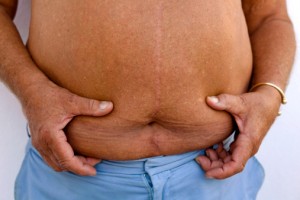Sweets After Weight Loss Sugery: Smart Choices
Sweets are a real problem for people who have undergone gastric bypass or lap-band weight loss surgery. Patients report feelings of loss for sweets and strong cravings. Yet patients know sweets pose several problems after weight loss surgery including dumping syndrome and weight gain. Patients who indulge in sweets not only get physically ill they also suffer feelings of failure and self-loathing for lack of will power.
According to Dr. David Katz in his book The Way to Eat a sweet tooth is not a matter of will power it is a matter of genetics. Early humans found sugar was a quick source of energy when they consumed it in the form of fruit, honey and sugar cane. So the tendency to like sweet is in our genetic code. But the difference today from then: sugar is now highly processed and in abundant supply.
Dieters consider sugar evil and blame sweets for weight gain. According to Dr. Katz “Sugary foods are often high-fat, calorie-dense foods as well; the pleasant taste of sugar stimulates high intake while the fat does much of the damage in terms of calories, weight gain and adverse health affects.”
I like that Dr. Katz’s attributes our genetic code for the sweet tooth – in my pre-WLS dieting life I considered myself a weak failure for having a sweet tooth. Unfortunately, my bariatric surgeon didn’t fix my genetic code for sweets. But what did happen during the early post-op and the weight loss phases is my interest in sweets waned. I believe once I was off the carb-fat-sugar roller coaster my body adapted to the more nutritional diet without processed sweets.
Limit Sugar For Health:
General health guidelines indicate we should limit sugar intake, particularly processed sugar. Dr. Katz advises “Make some general commitment about the acceptable place of sweet foods in your diet.” He adds, “Such a commitment is only as good as your follow-through, of course. But making decisions about tempting foods at a time other than when you are tempted is a good strategy in general.”
For WLS people with gastric bypass that commitment is firm – most patients will get sick (dumping) if they consume sugary products. Lap-band patients don’t live with that fear, they need some personal resolve to limit or avoid sugar products. For all of us the desire to maintain our weight loss should be a good motivator.
Sugar Substitutes:
So far we have two facts: 1- We are genetically coded to desire sweets and 2- We need to limit sugar intake for our health. Could two facts be more contradictory?
A variety of artificial sweeteners are available from the sugar alcohols (Sorbitol, Xylitol and Mannitol) that cause gas and bloating problems to the non-nutritive sweeteners such as Saccharine, Aspartame and Sucralose (Splenda). Dr. Andrew Weil, author of “The Healthy Kitchen” is concerned about the use of artificial sweeteners. In his book he says, “In the first place, there is no evidence that they help anyone lose weight, although that is why people use them…Second, most of them taste funny. And, most important, the highly popular ones may be harmful.” He sites studies that link Saccharin and Aspartamine to health problems.
Dr. Weil recommends sucralose, sold under the band name Splenda. He said, “It tastes better than aspartame and appears safer.”
Splenda, Sugar and WLS Diet:
In general nutritionists working with WLS patients agree Splenda is an acceptable sweetener for patients when used in moderation. (Moderation – that word comes up a lot in our WLS food discussions!)
Many recipes can be adjusted to use all Splenda or a blend of Splenda and sugar. Using a blend of sugar and Splenda produces the best results for texture and moistness yet cuts half of the calories and carbohydrates. Using all Splenda eliminates all sugar calories, however, some consumers say using all Splenda results in an unpleasant after taste and unappealing texture. Using all sugar is not an acceptable option for WLS patients for reasons already noted.
Knowledge, Moderation, Occasion
Ultimately, the key to including sweets in the WLS lifestyle is knowledge, moderation and occasion.
Love your new diet:
Finally, rather than focusing on all the beloved lost foods spend time enjoying and loving your new way of eating. Dr. Katz said, “Even though you were born to like sugar, if your diet shifts, step-by-step to one richer in nutrient-dense, calorie-dilute, natural foods, there will simply be less place for processed sugar in your diet.”

Kaye Bailey © 2006 – All Rights Reserved
An award winning journalist and former newspaper editor Kaye Bailey brings expertise in writing and personal experience with gastric bypass surgery to EzineArticles.com. Kaye Bailey is the founder of LivingAfterWLS, an online market driven social space evoking feelings of comfort, understanding, knowledge, warmth, acceptance, trust and happiness.
LivingAfterWLS
LivingAfterWLS Blog
- DON'T MISS
- Weight Loss Pill Cures
- Dieting – Is it Overrated?
- 3 Tried and True Options for Obesity Help
- 10 Pounds to Lose and What to Do?
- From now on, Europe focuses on dieting pills
- What Is Hoodia Gordonii And How Its Related To Dieting
- My Big Fat Greek Miracle – A Family Physician Steps on the Scales and Takes a Swing at Weight Loss
- Are you an emotial eater?
- Just What Causes Excessive Weight
- You Can’t Lose Weight if You Listen to Your Family and Friends




